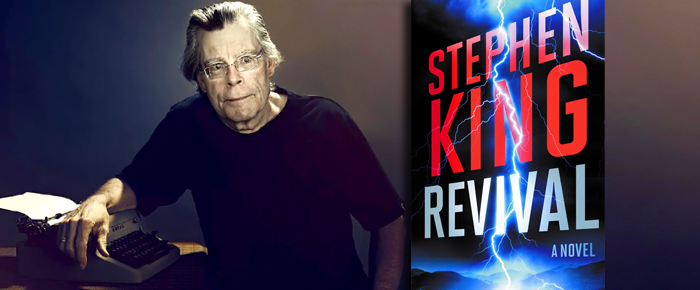
By Heidi Simmons
—–
Revival
By Stephen King
Fiction
—–
There are big mysteries we live with everyday. Electricity is one of them. No doubt we take electrical current for granted. Hit a switch and the lights come on. Put a charger into a socket and our electronic devises are restored to full power. In Stephen King’s Revival (Scribner, 416 pages), electricity is both metaphor and mystery.
Revival is narrated by the character Jamie Morton. He begins with comparing life to the movies. Jamie suggests everyone is the star in his or her own film with a cast of characters. There are main characters, a supporting cast, bit players and extras. And then there is the “fifth business,” which is someone who appears periodically as a change agent entering as a friend or foe during a crisis.
The story begins in 1962 when Jamie is only six. Charles Jacobs is a new pastor in town and the little boy is immediately drawn to him. The Methodist church is just a stone’s throw away from Jamie’s rural home. Jamie is the youngest in the Morton family. His parents, sister and four brothers all embrace the young pastor, his wife and baby.
The charismatic Jacobs rebuilds the church membership and the congregation thrives. The pastor is an electrical hobbyist who uses electricity as a metaphor for God’s presence, power and mystery. He constructs little electrical games for the youth bible study.
When Jamie’s bother is injured and losses his voice, Jacobs uses electric shock to help him regain his speech. It works! But Jamie is not sure if the healing is psychosomatic, real or an act of God.
When everything seems perfect in all the lives of the characters in Jamie’s world, there is a terrible accident that changes everything for everyone in the community.
When Jacobs delivers his next sermon, it is a reality check for the now preteen Jamie, and his belief system – which is forever altered.
Jamie grows up. He discovers he has a natural gift for the electric guitar and becomes a member of a rock band. The road leads to a heroin addiction that nearly kills him. Then he comes across his “fifth business,” his old pastor Jacobs at a county fair.
Jacobs is using electricity like magic. He is photographing and super-imposing people using light and electricity. Pretty girls volunteer to come up. He electrifies them and gives them a picture. The crowd and volunteers are amazed and mystified.
When Jacobs uses shock therapy on Jamie to stop his heroin craving, there are strange side effects – bad dreams, blackouts and strange occurrences. Jacobs and Jamie part ways. Although Jamie is grateful, he is also fearful of what happened and becomes suspicious of Jacobs’ motives.
The pastor becomes rich as a healer, shocking hundreds of people and restoring all types of ailments in old-fashioned tent revivals. Years later, the two cross paths again. This time there is no doubt Jacobs is dangerous and playing with fire – electrical fire that is. Jacobs recruits Jamie for an important experiment using electricity to open a portal to the ultimate mystery of what happens after death. It becomes clear that Jamie, as well as all the other shock therapy recipients, have only been experiments for Jacobs’ insanity.
When Jacobs opens that “after life” world, it is horrific and not like anything Jamie learned in Sunday school. Jamie discovers he is a conduit to another dimension. And it’s not just him, but all the other victims of Jacobs’ electric shock treatment.
Author King lures the reader into a bucolic setting that spans decades, and then jolts the reader. Jamie’s first person narration of his life from the sixties to the present is credible, fascinating and terrifying. After all, he is telling his story. Even Jamie questions what he truly understood as a boy. But what is certain is he survived the ordeal. As always, Kings paints a familiar and relatable world. This makes Revival strangely fun, engaging and horrific.
The story explores the nature of electricity through the heart-broken, grief-stricken pastor. His hobby becomes a full-blown obsession. “Electricity is the basis of all life,” Jamie recalls. Jacobs tells him the human heart runs on microvolts, a current generated from potassium that the human body converts into electrically charged particles, which also regulates the brain, cells and “Everything else!”
Jamie asks Jacobs about his secret energy supply and why he is doing the electrical experiments on people, but the reader never gets a clear answer. Jacobs compares himself to the fifteenth century alchemist Ludvig Prinn. He sees himself exploring secrets that were covered up by the Church.
But surprisingly, Revival lacks a theological debate. There is a great opportunity for the pastor to argue the differences between faith and science, but it doesn’t happen. Jacobs is trying to see the other side of death. For a minister who last preached there is no God and no life after death, then why find a way over? Is it to prove there is no God or no heaven? Is it to be with his family? For revenge? We never understand the nature of Jacob’s experiments or the motive of his paradoxical obsession.
It could be argued that since Jamie is telling the story, we never fully comprehend Jacobs and his mission. After all, Jamie’s reliability as a narrator could be questionable. After all, he suffered electroshock “treatment.”
None the less, Revival would be more powerful and way more frightening if it directly challenged the Judeo Christian mythos and confronted faith — whether it’s in science or religion. Jamie does wonder how much of his life was predetermined and if indeed meeting up with Jacobs was fate and not free will. Like electricity, life is a mystery and when we seek the unknown it can indeed be shocking.
Revival is available this week.









































